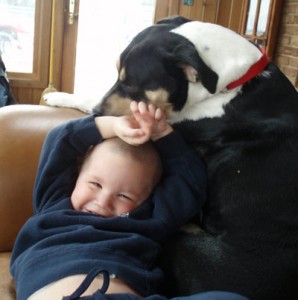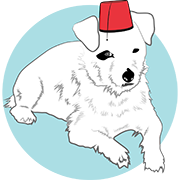
Pets don’t judge us. And play is an important way for children to communicate. Those two concepts help explain why Dr. Rise Van Fleet’s Pet Play Therapy program has proved so effective.
A licensed psychologist and registered play therapist supervisor, Van Fleet is also an approved evaluator with the American Kennel Club’s Canine Good Citizens Program and a full member of the Association of Pet Dog Trainers, so she can gauge both human and canine behavior.
The premise
In her interview with Eric Goebelbecker for Animal Cafe, Van Fleet explains, “Play therapy is a way of communicating with children. Kids reveal a lot more about what’s going on in their minds through play than through talking. It’s safer for them emotionally.”
As anyone who talks to a pet knows, animals are a perfect audience for our complaints. So with children who are often wary of adults, the dog can be a useful tool, adding an element of fun and excitement to therapy, helping kids learn in a way that they are open to.
Van Fleet notes that even kids who have a history of hurting animals can benefit. “We teach them how to create a relationship with a dog, help them to develop empathy,” she says.
Of course the dog is protected too. The point is for both dog — usually, Van Fleet’s rescued border collie mix, Kirrie — and child to enjoy the experience. If a kid is getting too rough with the dog, the session ends.
A variety of play options
There are many facets to the program. “We teach kids basic dog training,” Van Fleet explains, giving just one example of an activity. “Teaching the dog new tricks and helping the dog learn is a great way to stimulate the kids’ ability to solve problems for themselves.” The training experience also helps children understand patience. Having to wait for the dog to take the next step, to perform accurately before they get rewarded, teaches impulse control.
In addition, the emotional part of a dog’s brain is very similar to the emotional part of a human’s brain, so anthropomorphism isn’t a bad thing, Van Fleet contends. “Dogs have some of the same problems that people do, and we capitalize on that,” she says.
For example, Van Fleet might say to a foster child who is working with Kirrie, a rescue,”Can you believe someone didn’t want Kirrie?” Or, when working with a kid who was caught stealing, Van Fleet might allude to Kirrie’s counter surfing, noting that it’s wrong and explaining that “Kirrie really wanted it.” The child grasps the relationship to his own situation without feeling criticized.
Not your standard therapy dog
The pups in the program are not the perfect, human-oriented service dogs that you might find trained by the Delta Society. Rather, they have their own — albeit minor — issues. “It’s good for the dog to have some small problems that the kid can solve, so it’s kept real,” Van Fleet says. “The kids feel accomplished.”
And the dog is an equal partner in the relationship. One of the skills required of a handler/therapist is that he or she is able to read the dog, to understand canine body language. “We want the kids to have a good time,” Van Fleet says, “But we really want the dog to have a good time too.”
***
To learn more about Pet Play Therapy, listen to the podcast on Animal Cafe and then come back on Wednesday, June 8, 9pm EST to have a (playful?) chat with Dr. Van Fleet on Chat Cafe.

Now THAT is cool. =] Wish we could do stuff like that here, but we really don’t.
I’d never thought about something like that, so thanks for bringing it into the light. I’m really intrigued, and off to mind more information. =D
As always, love your posts. ;]
Thanks for the nice words, JJ; much appreciated. Training for those programs is becoming available, so let’s hope they will spread around the country. I agree, it’s a very cool concept.
Our dog, Sydney, has done wonders for our kid’s moods. When our girl’s mood disorder kept her from making or sustaining friendships, Sydney kept her company. He gave her an empathic, playful animal to take care of and Sydney was a real handful, after his first year of three families, so he needed the extra time and training.
That’s wonderful to hear, Deborah. What a nice story of a symbiotic relationship!
What a great program! Thanks for sharing it.